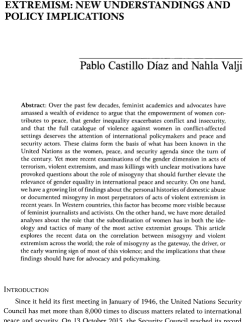This article is published within the Journal of International Affairs of Columbia University. The article seeks to situate terrorism and violent extremism within the context of the UN Women, Peace, and Security Agenda by arguing the role of misogyny within terrorist attacks. The article explores recent data on the correlation between misogyny and violent extremism, and explains that misogyny has served as a sorts of gateway, driver, and/or early warning sign of most of acts of terrorism; the implications for which could help to inform future counter-terrorism and preventing and countering violent extremism (CT/PCVE) policies and programmes. In this regard, the article argues that greater data should be collected and analysed to better understand salient expressions of misogyny, including anti-women rhetoric, and the marginalisation of women from public life, as well as systematic reporting of sexual and gender-based violence. The article also suggests that such early warning mechanisms could be accompanied with proactive support for women’s equality, leadership and empowerment, in order to further prevent all forms of violence.
2019
